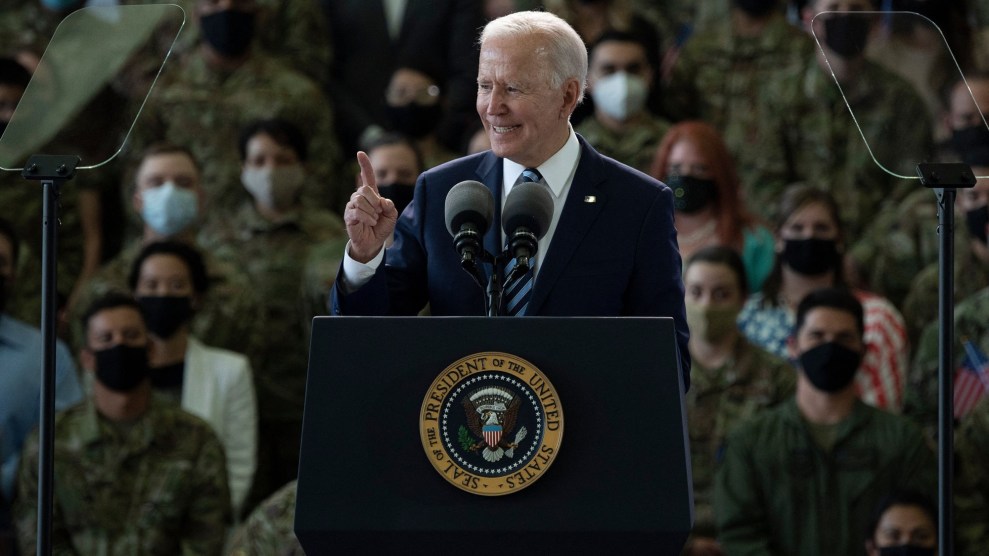
Houthi fighters and tribesmen stage a rally against the US and the UK strikes.AP
Last week, the United States, along with the United Kingdom, launched airstrikes against Houthi militants in Yemen. The Houthis—which have been aligned with Iran and rose in prominence during the ongoing civil war in Yemen—had been repeatedly attacking commercial vessels in the Red Sea. In a statement, President Joe Biden explained the strikes had “endangered US personnel, civilian mariners, and our partners, jeopardized trade, and threatened freedom of navigation.” According to US officials, the airstrikes left much of the Houthis’ military capabilities intact.
But the US-led airstrikes did accomplish something increasingly rare these days: bringing together some Republicans and Democrats. Almost immediately after the attacks, there was fear of a broadening regional war and pushback from US lawmakers of both parties. In particular, legislators condemned carrying out the airstrikes without prior authorization from Congress, which holds the constitutional power to declare war (even if the president is the commander in chief of the armed forces).
The President needs to come to Congress before launching a strike against the Houthis in Yemen and involving us in another middle east conflict. That is Article I of the Constitution. I will stand up for that regardless of whether a Democrat or Republican is in the White House.
— Ro Khanna (@RoKhanna) January 11, 2024
“This is an unacceptable violation of the Constitution,” Rep. Pramila Jayapal (D-Wash.), chair of the Congressional Progressive Caucus, posted on X. “Article 1 requires that military action be authorized by Congress.”
Rep. Chip Roy (R-Texas) said he was “fine with striking Yemen to defend critical shipping channel & response to aggression” but questioned under what authority the attacks were carried out. Republican Rep. Nancy Mace of South Carolina declared: “This is where we should put party aside and stand for the oath we all took: Congress alone decides if we go to war. I join my colleagues on both sides insisting we follow the Constitution.”
Despite the Constitution’s separation of war powers between Congress and the executive branch, questions about unilateral presidential use of force have often arisen. So much so that in 1973, at the tail end of the Vietnam War, Congress passed—over then-President Richard Nixon’s veto—the War Powers Resolution “to reassert what it viewed to be its constitutional prerogatives regarding war and peace,” explains Brian Finucane, senior adviser for the US program at the International Crisis Group and previously an attorney advising the State Department on issues relating to war.
On Tuesday, Mother Jones spoke with Finucane about the limitations of the War Power Resolutions, the continued US-led airstrikes against Houthis in Yemen, and whether laws around how we go to war are being violated.
This conversation has been edited for length and clarity.
Several members of Congress, both Democrats and Republicans, have accused President Biden of violating Article I of the Constitution by authorizing air strikes on Yemen without seeking congressional approval. Others say it was within his presidential authority to do so. What do you make of those charges?
I think a lot of those tweets from members of both parties are overlooking the broader context here and they are treating the strikes on January 11 and January 12 as an isolated event. That’s not the case at all: The United States has been engaged in fighting the Houthis, and engaged in hostilities, in my view, under the War Powers Resolution, since the middle of October.
That is when US forces in the Red Sea began shooting down drones and missiles that the Houthis were launching at Israel. After, the Houthis shifted from trying to target Israel directly to targeting commercial vessels in the Red Sea—initially pointedly with some connection with Israel, though that doesn’t seem to be always the case. And then the US interposed itself between those projectiles and the commercial vessels and started shooting those out. You may view defending Israel and defending commercial vessels as perfectly legitimate. But it was a decision by the US government to undertake military action—a conscious decision.
So, the issue is not whether the new strikes violate the Constitution, but it’s whether this entire ongoing armed conflict runs afoul of the War Powers Resolution. In my view, it does.
It’s generally accepted by most experts that the president has the authority to use force without congressional authorization to repel sudden attacks at a minimum to defend US citizens abroad, including US service members. But even if you accept that, it’s quite another thing to introduce US armed forces into harm’s way, such as in the Red Sea, and then use the foreseeable attacks on the US forces in those circumstances as a basis for then using force without congressional authorization.
You’re bootstrapping the defense of US forces that you placed in harm’s way as a justification for using military force.
What was the War Powers Resolution conceived to do? And how does that play into your analysis of the current strikes?
The War Powers Resolution seeks to do two things. The first is it establishes a system of reporting requirements when certain military actions are undertaken that need to be reported to Congress within certain time periods. And then, it poses substantive restrictions on the use of military force by the president when the president does not have congressional authorization—in other words, when the president is acting solely on the basis of his own constitutional authority under Article II of the Constitution.
The most important sort of reporting requirement for the context of Yemen is a requirement that within 48 hours of the president introducing US armed forces in hostilities. That introduction has to be reported to Congress in what’s referred to as a war powers report.
Relatedly, that introduction of US armed forces in hostilities starts a clock ticking. US armed forces have to be removed from hostilities after 60 days, unless Congress has authorized their continued engagement in hostilities.
In response to a question about war powers, President Biden has said he has “taken great care to ensure that military actions carried out under my command comply with this constitutional framework and that my administration consults with Congress to the greatest extent possible whenever military action is taken.” How is his administration justifying the current campaign against the Houthis?
They have really not explained their legal thinking about the US military actions in the Red Sea area since October. The report on the strikes of the 11th and 12th was the first notification of the War Powers Resolution. The administration had not previously reported the other activities, even though again, in my view, many of them certainly rose to the level of hostilities and similar actions have been reported in the past by prior administrations. We really don’t know the administration’s legal theories for taking the country to war against the Houthis without congressional authorization.
The War Powers Resolution letter to House Speaker Mike Johnson couches the response, not surprisingly, in terms of self-defense and the President’s responsibility to protect US citizens at home and abroad because US vessels were being attacked after the United States interposed themselves in this conflict. It also cites self-defense under international law consistent with Article 51 of the UN Charter.
The rationale for the strikes was framed in terms of deterring and degrading Houthi capacity to conduct further attacks. There’s reason to be skeptical on both fronts, particularly on the deterrence front. Houthis were involved in an armed conflict with the Saudis from 2014 onward in which the Saudis conducted a very heavy bombing campaign against the Houthis with no obvious deterrent effect. It’s not obvious why US or UK airstrikes on the Houthis would have a greater effect in terms of deterrence on the Houthis.
The last time Congress approved a declaration of war was during World War II. But the United States has engaged in several armed conflicts since then. How have past US presidents tested and, in some cases, circumvented the War Powers Resolution to unilaterally use military force without prior congressional approval?
The term “hostilities” is not itself defined in the law. While there’s legislative history indicating that Congress intended this term to be interpreted broadly, the executive branch has, unsurprisingly, interpreted it somewhat narrowly.
Presidents of both parties generally do not cite which provision of the War Powers Resolution they’re reporting under. Administration of both parties—the Reagan administration, but also the Obama administration—will try to slice and dice ongoing hostilities to pretend as if the 60-day clock somehow stopped and started all over again. They’ll file multiple reports suggesting it’s not a single armed conflict but that intermittent hostilities don’t cause the 60-day clock to run out.
Would you characterize those as loopholes that potentially render the War Powers Resolution useless?
There are proposals to overhaul the War Powers Resolution, including a measure called the National Security Powers Act in the Senate. And the courts have found a variety of mechanisms to avoid opining on the merits of the application of the War Powers Resolution to any particular set of facts by finding that members of Congress don’t have standing or finding that situations are not ripe for adjudication.
What has been built up in the executive branch is its own internal body of precedent—both in the form of written legal opinions interpreting the provisions, principally in the Department of Justice’s Office of Legal Counsel, but also in terms of unilateral action by various presidents that the OLC will cite as support for future actions or ongoing actions. That’s problematic because this is the unilateral and often self-serving interpretations of the executive branch that are being cited to justify its own conduct.
All of this means that, as a practical matter, the War Powers Resolution doesn’t have real teeth to it. Its implementation depends on the executive branch choosing to act in ways that may constrain its own actions.
I think one of the striking things here is how quiet Congress has been, at least until these most recent strikes, when at least some members of Congress started to raise concerns. I think we’re seeing Congress not assert its constitutional prerogatives and, frankly, constitutional responsibilities in a way that it should and has in the past. If Congress decided that it did not want continued US military operations in the Red Sea or elsewhere in the Middle East, they could simply defund those operations. The problem with that is it flips the Constitution on its head because the Constitution presumes that Congress will declare war, rather than Congress having to affirmatively vote to block war.














